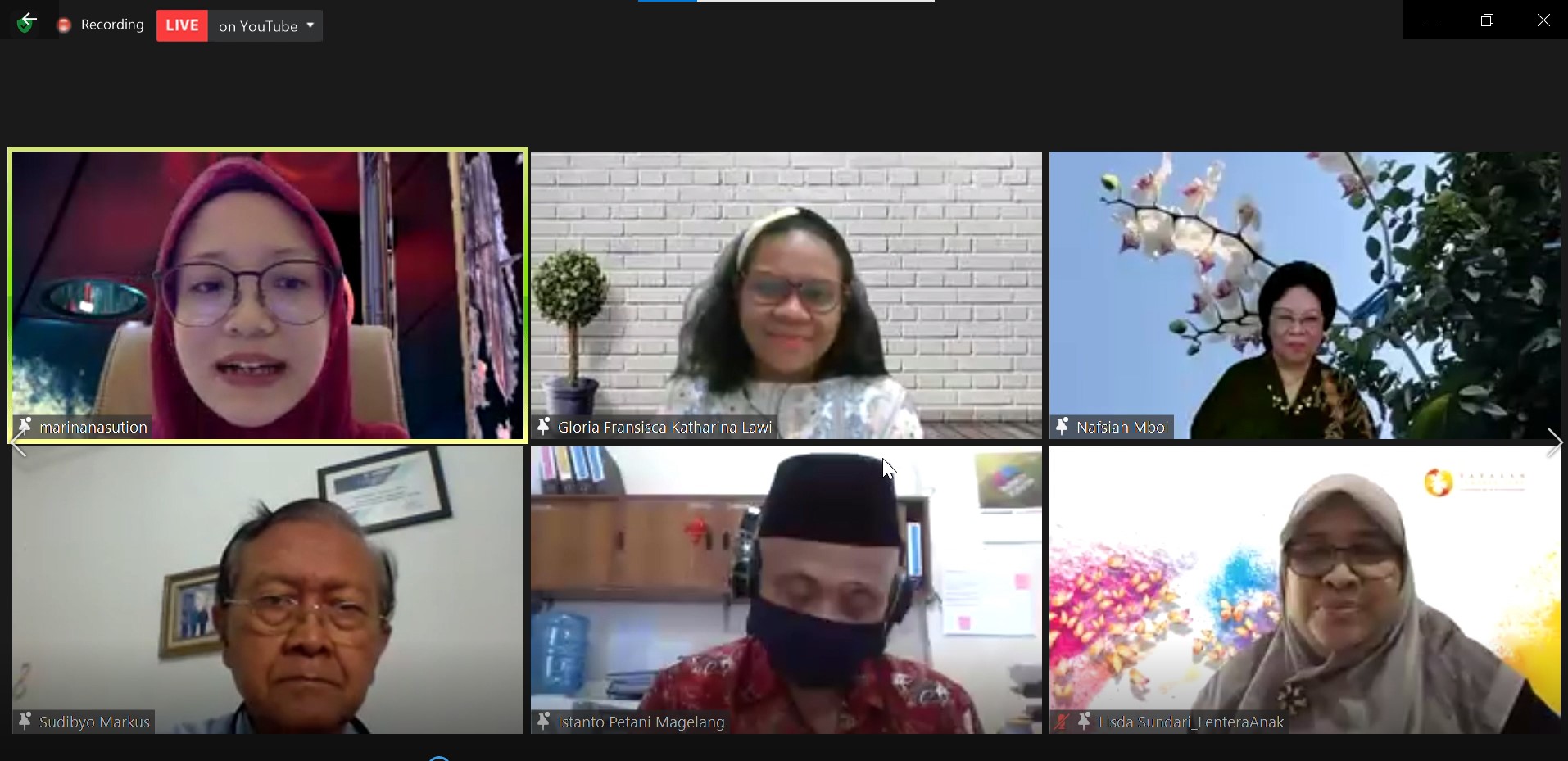
Chairwoman of Lentera Anak Foundation, Lisda Sundari, expressed her disappointment concerning protracted revision of the Government Regulation (PP) Number 109/2012 on “Safeguarding of Materials Containing Addictive Substances in the Form of Tobacco Products for Health” by the Health Ministry.
The Health Ministry was considered unresponsive to revise PP 109 although President Joko Widodo has included this regulation in the 2018 Government Regulation Drafting Program. “The Government Regulation as referred to is set [to be completed] in one year,” the second dictum of the policy read.
According to Lisda, the sluggish response by the Health Ministry to revise PP 109 would worsen the efforts to protect children’s health. The 2018 Basic Health Research (Riskesdas) showed that the percentage of smokers aged 10-18 years continued to increase. In 2013, the number of child smokers was 7.2 percent, but five years later it increased to 9.1 percent.
“Revising the regulation is needed to protect children. The state must responsively play its role, including in a pandemic situation,” said Lisda at an online discussion entitled “Refusing to Revise PP 109 is a Disobedience to the President’s Vision and Mission” organized by Lentera Anak with the Indonesian Consumers Foundation, National Commission on Tobacco Control, Fakta Indonesia and the Indonesia Institute for Social Development (IISD), Tuesday, June 22, 2021.
Outdoor cigarette advertisements, the growth of advertisements offering conventional and electronic cigarettes on the internet, as well as the cheap price of cigarettes are some factors that cause the number of child smokers to increase. Research from the Tobacco Control Support Center—the Indonesian Association of Public Health Experts, conducted in 16 districts and cities in 2018, showed that teenagers under 18 years old were being more exposed to cigarette advertisements through television (85 percent), banners (76.3 percent), billboards (70.9 percent), posters (67.7 percent), public walls (57.4 percent), public transportation (47.3 percent), internet (45.7 percent), newspapers/magazines (23.6 percent) , radio (17.4 percent) and cinema (12.4 percent).
The results of this research also reveal that outdoor advertising in stalls selling cigarettes has provided exposure of cigarette ads to those under 18 years old by 74.2 percent, followed by sporting events (46.6 percent), logos on merchandise (39.1 percent), music events (39 percent), distribution of free cigarette samples (14.7 percent), discount prices (12.3 percent), free gifts or special discounts (8.7 percent), cigarette coupons/vouchers (5.4 percent) and letters (6.5 percent). “Children are being the target [of cigarette ads]. The current regulation (PP 109) is not enough to protect them,” said Lisda.
The results of the above research is reinforced by another study from the Center for Social Security Studies (PKJS) University of Indonesia on the accessibility of retail cigarettes. PKJS UI researcher Risky Kusuma Hartono found 8,371 retail cigarette sellers in Jakarta. Thousands of cigarette sellers are spread across South Jakarta (1,293 stalls), East Jakarta (3,085 stalls), West Jakarta (2,139), North Jakarta (397) and Central Jakarta (1,457). As many as 61 percent of small shops selling cigarettes are located close to the education zone. “No less than a 100-meter radius from the education zone,” said Rizki, referring to a study entitled Density and Accessibility of Retail Cigarettes for School-Age Children in Jakarta: Overview and Control Policies, Wednesday, June 16, 2021.
Using Google Maps and Google Street View, the researchers also found that the distance between each retail cigarette seller was quite close. “The results of this study prove that cigarettes are quite easily accessible for the public, including children,” said Risky.
Using the various aforementioned data as a reference, former Health Ministry Nafsiah Mboi said she could not understand why the revision of PP 109/2012 had to go through a protracted process. “I don’t understand why some parties refused and hampered the revision despite the fact that the president had prioritized it,” Nafsiah said on Tuesday, June 22.
She was worried that the ongoing controversy would only hinder the efforts in striving to decrease the prevalence of smoking among children to 8.7 percent in the next three years. “Our children are getting more and more affected by smoking. The more they smoke, the more they will grow to be unproductive adults,” she said, referring to the 2021-2024 National Medium-Term Development Plan (RPJMN).
According to Nafsiah, children who were exposed to cigarettes were susceptible to contracting the Corona virus. The Indonesian Pediatrician Association as of June 16, 2021, recorded at least 113,000 children suffering from Covid-19. “As we know, smoking causes new diseases. We are currently facing two folds of epidemic threats,” she said.
Until this news was published, Jaring.id had not been able to confirm the reasons behind the protracted revision of PP 109. Questions sent via Whatsapp messages or phone calls to the Health Ministry’s Director of Health Promotion, Imran Nurali, and the Secretary of the Directorate General of Public Health, Kartini Rustandi, were unanswered. Similarly, the ministry’s Head of Communication and Community Services Bureau, Widyawati, also provided no response to the inquiry.
On Thursday, May 20, 2021, Widyawati told Jaring.id that the ministry would submit a review and a revised draft to the Coordinating Ministry for Human Development and Culture, Ministry of Industry and Ministry of Trade. “We are currently discussing it so we can’t provide any information. In the near future we will immediately inform the developments,” said Widyawati at that time.
Head of the Non-Communicable Diseases Division at the Coordinating Ministry for Human Development and Culture, Rama Prima Syahti Fauzi, said the main issues in the revision of PP 109 were advertising regulations, legal voids for electronic cigarettes and retail cigarette sales. In this case, the Coordinating Ministry for Human Development and Culture approved the revision that is currently being discussed by the Health Ministry. “The Coordinating Ministry for Human Development and Culture is all in unison. Everything has to be revised,” he said.
Rama said he was concerned about the high rate of stunting in smoking families. According to the Coordinating Ministry for Human Development and Culture, the number of stunting children reached 27.67 percent or 3.3 million children as of 2019. “The budget that should be allocated for the health of pregnant women is used to buy cigarettes,” said Rama.
‘Hiding’ behind the pandemic
The Ministry of Industry and the Ministry of Agriculture both firmly reject the efforts by the Health Ministry to revise PP 109/2012. The Ministry of Industry considers that the revision is not appropriate in the midst of the Covid-19 pandemic. “Revision of the government regulation is not appropriate at the moment. We are still facing the pandemic, and the situation of the Tobacco Products Industry (IHT) is also going down. For now, the focus should be on economic recovery,” said the Director General of Agro Industry at the Ministry of Industry, Abdul Rochim, as quoted by Antara on June 10, 2021.
A similar opinion was expressed by the Director of Seasonal Crops and Spices of the Ministry of Agriculture, Hendratmojo Bagus Hudoro. According to him, IHT’s performance last year was recorded to have decreased by 9.7 percent due to the increase in excise duty and the pandemic. “Revision of PP 109/2012 needs to be reviewed first, because it has an impact on various fields, one of which is the national economy. The government is currently implementing an economic recovery program until 2023,” said Hendratmojo on Monday, June 21, 2021.
Hendratmojo assured that the revision of PP 109/2012 would have a direct impact on farming families who had heavily relied on cigarette industry. “It’s not easy. It has to be mutually beneficial to each other,” he added.
The standpoint of the Ministry of Agriculture and the Ministry of Industry with regards to the revision of PP 109/2012 gained support by a number of organizations that are members of the Alliance of Indonesian Tobacco Society (AMTI), including the Association of Indonesian Farmers Harmony (HKTI) and the Association of Indonesian White Cigarette Producers (Gaprindo). Chairman of Gaprindo, Benny Wachjudi said the revision would not only heavily affect farmers, but also the existence of the cigarette industry. He was worried that the revision would result in a new wave of unemployment from this sector.
“We agreed to reject the revision of PP 109/2012. The Health Ministry should evaluate the implementation of PP 109/2012 and focus more on resolving the Covid-19 pandemic, instead of creating new problems,” he said.
Based on the notes of the General Chairperson of AMTI, Budidoyo, the revision of PP 109/2012 would put at least 6 million people in the IHT sector at stake. “The current revision effort no longer intends to impose restrictions, but to completely prohibit the existence of IHT. This is very unfortunate,” Budidoyo said in a written statement received by Jaring.id on Wednesday, June 9, 2021.
Responding to a wave of rejection that actually came from within the government, Chairman of the Indonesian Consumers Foundation (YLKI), Tulus Abadi, said the Ministry of Agriculture currently led by Yasin Limpo had ignored the president’s orders and sided with the industry. According to him, the Ministry of Agriculture failed to objectively look at the long-term impacts of the cigarette industry on health. “This is an attitude of defiance against the president,” he said.
Tulus hoped that President Jokowi would take more firm actions towards the Health Ministry, which is tasked with revising PP 109/2012. Failing to revise the regulation, he said, meant that President Jokowi would actually lose face in the eyes of the world. Moreover, until now, Indonesia has yet to ratify the Framework Convention on Tobacco Control (FCTC), which aims to protect the current and the future generations from health, economic, social and environmental impacts caused by the consumption of and the exposure to cigarette smoke. “The revision will avoid Indonesia’s image from being tainted further and being laughed at by other countries,” said Tulus.
The National Committee for Tobacco Control, Widyastuti Soerojo, said that the revision of PP 109/2012 was not related to the survival of tobacco farmers. This is because the profits from tobacco business so far do not go to farmers but to entrepreneurs. Tobacco farmers are the ones who are most disadvantaged by the tobacco trade system. “Therefore, it has nothing to do with the survival of tobacco farmers at all. I regret that this tobacco farmers issue has been politicized,” said Tuti on Friday, June 25, 2021.
Anggia Ermarini, member of the House of Representatives Commission IX, also shared similar comments. According to her, the control of the tobacco trade system has never been in the hands of farmers. Let alone determining the price of tobacco, even to become tobacco suppliers, farmers must comply with all the rules of the game that have been determined by the industry.
“The system has always been beneficial for big industries. Farmers are not prosperous,” said Anggia in an online discussion entitled ‘Is It True that Tobacco Farmers and Labors are Prosperous in the Hands of the Cigarette Industry?’ organized by the National Tobacco Control Commission on Friday, June 25, 2021.
Therefore, the member of the National Awakening Party (F-PKB) faction considered the need for proportional tobacco control. “We will especially encourage the decrease of smoking among children,” she emphasized.







